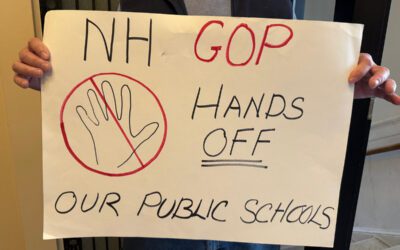
School bag in a classroom
A group of House Democrats is asking the New Hampshire Supreme Court to consider a new model to fund schools in the state.
In a brief filed to the court last Monday, the lawmakers asked the court to implement a “needs-based” approach for school funding.
The state of New Hampshire is facing two lawsuits—Contoocook Valley School District et al. v. State of New Hampshire and Steven Rand et al. v. State of New Hampshire.
One challenges that the state does not grant districts adequate funds per student to keep schools operational, forcing them to burden local property taxpayers to make up the difference. The other argues that the current funding model creates unfair disparities among municipalities.
Last November, Rockingham Superior Court judge, David Ruoff, ruled in favor of the plaintiffs in both cases, and held that the $4,100 per pupil base funding amount should be increased to $7,356.01.
As per Ruoff’s ruling in the second lawsuit, statewide education property tax (SWEPT) that districts raise by taxing local property is unconstitutional. Under an earlier version of SWEPT, excess revenue in any municipality would go to the state’s education trust fund that would then redistribute it to towns in need. However, the state’s 2011 decision allowed wealthier districts to retain that amount, widening the chasm between rich and poor towns.
The move comes after a group of House Republicans filed their own brief in the New Hampshire Supreme Court arguing the state has no obligation to fund an adequate education in the state, an argument resulting from the landmark Claremont school funding decisions, which Republicans want to overturn and Democrats want to keep, while asking the Supreme Court to clarify their meanings.
According to the decisions from the 1990s, the state has a constitutional obligation to ensure an “adequate” education for all students.
A 2020 independent legislative commission, tasked with finding the best way forward for school funding called New Hampshire’s current model “inequitable,” and found that students’ performances correlated with the wealth of their school districts.
The state has appealed Ruoff’s rulings. Oral arguments have not been scheduled yet.
Support Our Cause
Thank you for taking the time to read our work. Before you go, we hope you'll consider supporting our values-driven journalism, which has always strived to make clear what's really at stake for New Hampshirites and our future.
Since day one, our goal here at Granite Post has always been to empower people across the state with fact-based news and information. We believe that when people are armed with knowledge about what's happening in their local, state, and federal governments—including who is working on their behalf and who is actively trying to block efforts aimed at improving the daily lives of Granite State families—they will be inspired to become civically engaged.


NH Supreme Court’s open enrollment ruling could pit public schools against each other
In 2015, before school choice emerged as one of the more contentious education issues in New Hampshire, Franklin became the first district in the...

New Hampshire disability community rallies against federal cuts to special education
By William Skipworth / New Hampshire Bulletin Angelina Leo, an Exeter High School senior, said that without the special education services she...

Republicans advance bill for universal school district budget caps
By Ethan DeWitt/ New Hampshire Bulletin Republican lawmakers are reviving an effort to impose mandatory budget caps on school districts, arguing the...

New Hampshire has one of highest student loan payments in US, according to WalletHub
Do you have student loans to pay off? You're certainly not alone. Personal finance company WalletHub released its list of states with the...

Federal judge bars NH from enforcing DEI ban on most school districts
A federal judge on Oct. 2 blocked New Hampshire's new ban on diversity, equity and inclusion initiatives in public schools from taking effect,...

The oldest college in New Hampshire is older than the U.S., one of top 15 U.S. colleges
It's one of the best colleges in the country, according to U.S. News & World Report 2026 ranking of the country's best colleges, but it also...




